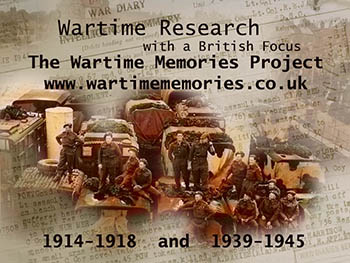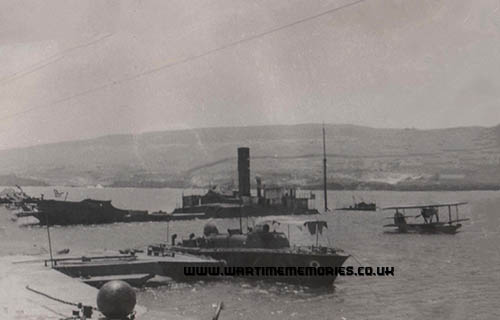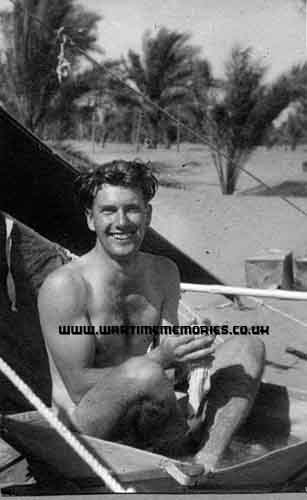Extracts from "In the Nick of Time" by Nick Berryman of 294 Squadron
Almaza, near Cairo, was a tented encampment and a week there nearly drove me to drink. I found RAF HQ Middle East and stirred a Wing Commander to sufficient motivation and annoyance to have me moved. I found myself standing in the rear of an open truck bouncing and swaying up the desert road which leads from Alexandria for the whole length of the North African Coast.
Egypt in February can be very cold and that particular morning it was. In half an hour I, straight from England and complete with greatcoat and gloves, was frozen. It was then that I noticed an Australian Pilot Officer Air Gunner without any such protection, looking as blue as his dark blue uniform and trying to hang on to the front guard rail of the truck. Seeing that his hand was numb with cold, I stuck my hand in a pocket and offered him the use of a glove.
From then on, he used always to introduce me to his Aussie friends as "the first decent Pommie bastard" he had yet to come across. The gunner was Bill Dransfield from Bondi Beach, NSW, and we were both bound for LG91 Amaryia and 294 Squadron.
Bill had been up and down the desert for a year seeing service with Marauders and helping to drive the Germans back to Tripoli. Here they found themselves pincered between British troops advancing West and the Americans advancing East and decided to evacuate to Sicily and Italy. For them it was the beginning of the end, as their Russian front was also crumbling. There was a lot of fighting to do yet however, and it was to be sixteen months before the Germans laid down arms and twenty months before the Japanese surrendered.
Whilst the assault troops of the three services battled it out in the front line, the back up troops and training squadrons were left in the rear. For Bill and me at Amaryia it was to be a quiet time. 294 Squadron commanded by Wing Commander R G Walker DFC was part of Middle East Coastal Command and was equipped with Wellingtons and Walrus aircraft used for search and recovery, taking in the desert as well as the sea.
Upon arrival, I accepted the inevitable. I was type cast as a Walrus ASR pilot. Both new to the squadron, Bill and I had no difficulty in becoming crewed up and were later joined by another Flying Officer Harry Gibbins, newly arrived from the Seychelle Islands in the Indian Ocean, where he had done a tour with a Catalina squadron.
I was fortunate, as they were both to prove excellent airmen and companions. Bill and I were of similar temperament, while 'Gibby' was rather more reserved and cautious. From one or two bits of correspondence of that time, I have gleaned that he was not always too happy about the way Bill and I set about the job, but seemed resigned to the fact that I was a reasonable enough pilot who was aiming to see the war through.
As for Bill, he was a 'tough cookie' and would have gone through hell and high water with me, all based on the fact that I had loaned him a glove and was his idea of an English gentleman.
Living in the desert was a new experience for me, but not too unenjoyable once the first shock of primitive living was over. Food was not enjoyable and hot meat loaf, Spam and dehydrated vegetables were the staple diet. When water was plentiful, one could take a shower from a forty gallon oil drum propped above head height. The latrines were poles over a pit where one pole sufficed for five men. The desert here was very stony, not the loose sand so often seen in films about the French Foreign Legion.
Two other squadrons used the landing ground, No. 6 with their Hurricanes and the 13th Hellenic Squadron flying Marylands. Part of the flying operational risk seemed to be dodging the Marylands and their Greek crews on take off. They always appeared to dislike the direction most other people decided upon, but they were never dull. When things went very quiet they could be relied upon to disappear temporarily into the depths of sea or desert, which of course was very good for keeping 294 on the alert. With the occasional search and sea landing practice, we kept our hands in.
Bill had never even seen a seaplane before and Gibby was used only to the large Catalinas. The first few trips we did, landing and taking off from the sea in the bone shaking cavorting Walrus, were an eye opener to both of them. More than once I saw Gibby turn deathly pale whilst Bill cursed his luck trying to get some sense out of the TR9 radio. This was while sea water could be pouring in through the open hatch of the cockpit as we made a particularly difficult take off. As I used to explain, at least the Mediterranean was warm, and they should have experienced the cold Atlantic to qualify for a moan.
In this manner we got over the first couple of months. As a crew we settled down well, but it did seem strange to me to have to consider other people and even to take the advice of a Navigator. Until then, it had been up to me to relocate myself when lost. I had to admit however, that when searching for long hours at sea the operation was more likely to be of some accuracy when Gibby had his chart and pencil to hand. The rivalry between us was always evident and I was constantly reminding him that to me a 'Nav' was just extra weight.
In the April, the squadron base removed to Edku just south of Aboukir and in the May I, with team, was quickly sent to Gambut to take over from a crew who had come to a sticky end in the Tobruk area. The dead pilot's name was Jack Martin from Newcastle and I had the unpleasant task of packing his personal effects off to his wife. Amongst his flying kit was a superb pair of all leather 'Escape' boots. So named because the tops could be cut off, leaving a normal pair of black shoes which would be less noticeable in enemy occupied territory. Being government property I changed these with my own less prestigious boots and wore them for many years during and after the war.
Gambut, for the Walrus, was over three hours flying from base, so we were quite cut off and living conditions were very basic. There I was kept busy, searching mostly for twin-engined bomber aircraft of the Marauder, Beaufighter and Mosquito type which failed to return after bombing the enemy in the Aegean and Adriatic areas. One such mission involved the picking up of four German aircrew, one of whom was so belligerent that I was delighted to hand them over to a Royal Naval Gunboat. Bill was in his element, giving as good as he took, but the situation was potentially dangerous and Gibby and I were not feeling heroic.
Returning to the Coast we had an engine failure and had to be rescued ourselves by an RAF Rescue Launch from Derna. It was a long day, for when we arrived in Derna Harbour we had been at sea for six hours.
Bill repaid his debt to the launch skipper by offering to rid the bilges of rats. Using one of our smoke floats, he pulled the pin forgetting there was no smoke without fire. The joint efforts of my crew and the launch crew saved the day however, and a bit of paint here and there hid a multitude of sins.
The engine repair to the Walrus took four days and was carried out by an earnest bunch of engine fitters from Gambut who, unused to tossing about, kept dropping their spanners into the water. Bill came into his own again as he was a magnificent swimmer and diver, so consequently much of the stuff was retrieved.
The story went at the time that the engineering officer in charge obtained the engine piston and cylinder he required from an Italian aircraft which had crashed in the desert behind Derna. Until now I have never been sufficiently interested to find out if some Italian aircraft did use Bristol Pegasus engines however I am informed that the SM79 did. Before 1939 Bristol did make engines for other countries, so there could be a foundation for the tale.
Then the three of us got sand fly fever. This illness causes stomach pains and constant visits to the lavatory. After an air test which proved to be satisfactory, we wanted to get back to Gambut, over an hour and a half flying time to the East. A joint visit to an Army Doctor filled us sufficiently with stomach cement to enable me to contemplate the trip.
A bouncy sea take off did not help matters and I soon noticed Gibby's gradually tightening lips. The occasional bellow from Bill at the back urging me to "Open up the bleedin' taps mate" alerted me to a degree of urgency to shorten the air time as much as possible. By the time I could see the airfield dust at Gambut, forty miles and twenty minutes away, Gibby's legs were tread-milling. Bill's shouts were replaced by his appearance at my right shoulder and looking very red in the face. I myself was feeling uneasy.
When the airfield was reached, I told the Airfield Control I had an emergency and was coming straight in. I heard them advise other aircraft to clear the runway and landed the Walrus. I literally flew it in the direction of the lavatory which I knew to be a 'three holer'.
By the time I had knocked the switches off, Bill and Gibby were running, knees bent, for the last thirty yards. Taking a deep breath, I too hopped over the side but forgot to unplug the microphone which was attached to my flying helmet, so spent several seconds untangling myself (which nearly proved disastrous). I arrived at the tin hut to find holes one and two occupied by gently smiling Bill and Gibby. The third was occupied by someone else. This was no time for niceties so I went round the back.
Later that day Flying Control rang the flight to ask what the emergency was. Someone informed them, "The crew had the shits". We wondered how that would be worded in the Operations Book.
The Walrus repair was not permanent, it reappeared and three days later we were relieved by another aircraft and crew and we flew back to Edku.
Shortly before leaving Gambut I was to write to Ray and Sherry complaining that I had received no word from them for six or seven weeks, that a child could not be taking up all their time yet and would they write to me when the baby was born. My news was that I was finding it difficult to keep my clothing clean and was going through many bars of Swan Soap. I could heat water in an open-topped five-gallon drum which, placed upon a mound of petrol-soaked sand, soon brought the water to boil. Wash day was fraught with peril, as my singed arms and eyebrows showed to the full.
Back in the Delta and with less opportunity to hog the flying hours, I set about making myself as comfortable as I could. I started by lowering the floor of my tent to give more headroom and borrowed a quilted aircraft engine cover from maintenance flight. The effect was pleasing, I had wall to wall carpeting. Two strategically placed five-gallon drums gave hot and cold running water. The hot in the evening only, as 'Mr Sun' did the heating.
Living with Bill was not easy in a confined space, so I contrived to get him moved to a tent with another untidy chap. Gibby made his own arrangements too. Sometimes I was sharing with an eccentric Canadian Wellington pilot who was as nutty as a fruit cake, but after I discovered two ducks named Malesh and Alekefik swimming in my sunken bath area, he too was banished. I reigned in solitary state surrounded by my own contrived luxury. Outside the tent stood some date palms and beyond them was the bay and swimming. I had it made.
June 6th dawned and I was ordered to find and pick up something reported in a shipping lane West of Alexandria. It took three hours and twenty minutes to locate the object, a floating mine. Thinking it best not to pick it up, I told Bill to blow it up with the Lewis gun. The combination of my piloting and his gunnery turned that little job into a debacle, but we did sink it. Meanwhile on the North coast of France, the Allied invasion had begun which made our contribution to the war effort appear pretty feeble. The crew grabbed a week's leave and we purchased the other half of the Hotel Mediterranee in Alex.








